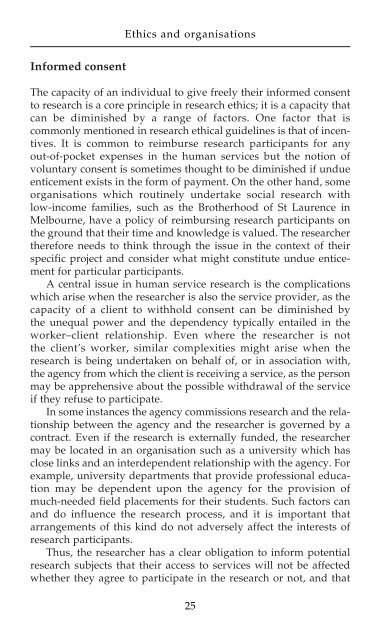Qualitative Research in Practice : Stories From the Field - Blogs Unpad
Qualitative Research in Practice : Stories From the Field - Blogs Unpad
Qualitative Research in Practice : Stories From the Field - Blogs Unpad
Create successful ePaper yourself
Turn your PDF publications into a flip-book with our unique Google optimized e-Paper software.
Ethics and organisations<br />
Informed consent<br />
The capacity of an <strong>in</strong>dividual to give freely <strong>the</strong>ir <strong>in</strong>formed consent<br />
to research is a core pr<strong>in</strong>ciple <strong>in</strong> research ethics; it is a capacity that<br />
can be dim<strong>in</strong>ished by a range of factors. One factor that is<br />
commonly mentioned <strong>in</strong> research ethical guidel<strong>in</strong>es is that of <strong>in</strong>centives.<br />
It is common to reimburse research participants for any<br />
out-of-pocket expenses <strong>in</strong> <strong>the</strong> human services but <strong>the</strong> notion of<br />
voluntary consent is sometimes thought to be dim<strong>in</strong>ished if undue<br />
enticement exists <strong>in</strong> <strong>the</strong> form of payment. On <strong>the</strong> o<strong>the</strong>r hand, some<br />
organisations which rout<strong>in</strong>ely undertake social research with<br />
low-<strong>in</strong>come families, such as <strong>the</strong> Bro<strong>the</strong>rhood of St Laurence <strong>in</strong><br />
Melbourne, have a policy of reimburs<strong>in</strong>g research participants on<br />
<strong>the</strong> ground that <strong>the</strong>ir time and knowledge is valued. The researcher<br />
<strong>the</strong>refore needs to th<strong>in</strong>k through <strong>the</strong> issue <strong>in</strong> <strong>the</strong> context of <strong>the</strong>ir<br />
specific project and consider what might constitute undue enticement<br />
for particular participants.<br />
A central issue <strong>in</strong> human service research is <strong>the</strong> complications<br />
which arise when <strong>the</strong> researcher is also <strong>the</strong> service provider, as <strong>the</strong><br />
capacity of a client to withhold consent can be dim<strong>in</strong>ished by<br />
<strong>the</strong> unequal power and <strong>the</strong> dependency typically entailed <strong>in</strong> <strong>the</strong><br />
worker–client relationship. Even where <strong>the</strong> researcher is not<br />
<strong>the</strong> client’s worker, similar complexities might arise when <strong>the</strong><br />
research is be<strong>in</strong>g undertaken on behalf of, or <strong>in</strong> association with,<br />
<strong>the</strong> agency from which <strong>the</strong> client is receiv<strong>in</strong>g a service, as <strong>the</strong> person<br />
may be apprehensive about <strong>the</strong> possible withdrawal of <strong>the</strong> service<br />
if <strong>the</strong>y refuse to participate.<br />
In some <strong>in</strong>stances <strong>the</strong> agency commissions research and <strong>the</strong> relationship<br />
between <strong>the</strong> agency and <strong>the</strong> researcher is governed by a<br />
contract. Even if <strong>the</strong> research is externally funded, <strong>the</strong> researcher<br />
may be located <strong>in</strong> an organisation such as a university which has<br />
close l<strong>in</strong>ks and an <strong>in</strong>terdependent relationship with <strong>the</strong> agency. For<br />
example, university departments that provide professional education<br />
may be dependent upon <strong>the</strong> agency for <strong>the</strong> provision of<br />
much-needed field placements for <strong>the</strong>ir students. Such factors can<br />
and do <strong>in</strong>fluence <strong>the</strong> research process, and it is important that<br />
arrangements of this k<strong>in</strong>d do not adversely affect <strong>the</strong> <strong>in</strong>terests of<br />
research participants.<br />
Thus, <strong>the</strong> researcher has a clear obligation to <strong>in</strong>form potential<br />
research subjects that <strong>the</strong>ir access to services will not be affected<br />
whe<strong>the</strong>r <strong>the</strong>y agree to participate <strong>in</strong> <strong>the</strong> research or not, and that<br />
25

















